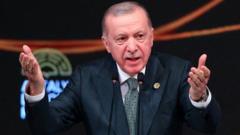Concerns rise over political maneuvers as Erdogan juggles his term limits amid mounting opposition pressure.
Erdogan's Constitutional Changes: A New Strategy or Mere Speculation?

Erdogan's Constitutional Changes: A New Strategy or Mere Speculation?
President Erdogan insists constitutional revisions are for the country, not for his re-election ambitions.
In a recent statement, Turkish President Recep Tayyip Erdogan refuted claims that he aims to amend the constitution to extend his presidency beyond 2028. With a leadership history spanning 22 years—first as prime minister from 2003 and president from 2014—Erdogan clarified, "We want the new constitution not for ourselves, but for our country. I have no interest in being re-elected or running for office again."
Despite Erdogan's assertions, speculation around his desire to remain in power has intensified following recent comments and actions. In January, he hinted at a potential candidacy when asked by a singer. The following day, party officials acknowledged that the topic of his re-election was on the agenda, claiming, "What is important is that our nation wants it."
Opinion polls indicate a declining support for Erdogan, most notably behind Istanbul's opposition mayor, Ekrem Imamoglu. Imamoglu, who was arrested on corruption charges—widely seen as politically motivated—has become a rallying point for dissent, leading to significant protests. Since his detention, his popularity appears to have surged, further complicating Erdogan's political landscape.
Erdogan's recent efforts to reform the constitution have drawn attention as he criticized the existing framework, stating it was devised post-1980 military coup and may not reflect modern Turkish society. He proposed that adapting Turkey's governance is necessary, questioning whether "it is possible to get anywhere with a constitution that was written under the conditions of a coup?"
While the current constitution restricts a president to two five-year terms, Erdogan argues that his initial term should be considered under the old parliamentary system, thereby providing rationale for a potential change. However, to initiate a constitutional referendum needs a coalition of 360 MPs within the 600-seat parliament—a target Erdogan currently cannot meet.
Simultaneously, Erdogan's initiatives to address long-standing issues with the Kurdish militant group PKK have sparked interpretations that he seeks Kurdish support for a new constitutional approach. The pro-Kurdish DEM party's backing, bolstered by any steps toward peace with the PKK, could significantly shift the balance of parliamentary power.
Critics, including opposition members, assert Erdogan's efforts to run again are futile due to the limitations of a constitution he shaped. They argue that he may consider calling early elections; however, such a move appears unlikely at this juncture. As Turkey enters a critical phase in its political landscape, the impact of manipulation of political rules will be a focal point of public scrutiny in the years to come.
Despite Erdogan's assertions, speculation around his desire to remain in power has intensified following recent comments and actions. In January, he hinted at a potential candidacy when asked by a singer. The following day, party officials acknowledged that the topic of his re-election was on the agenda, claiming, "What is important is that our nation wants it."
Opinion polls indicate a declining support for Erdogan, most notably behind Istanbul's opposition mayor, Ekrem Imamoglu. Imamoglu, who was arrested on corruption charges—widely seen as politically motivated—has become a rallying point for dissent, leading to significant protests. Since his detention, his popularity appears to have surged, further complicating Erdogan's political landscape.
Erdogan's recent efforts to reform the constitution have drawn attention as he criticized the existing framework, stating it was devised post-1980 military coup and may not reflect modern Turkish society. He proposed that adapting Turkey's governance is necessary, questioning whether "it is possible to get anywhere with a constitution that was written under the conditions of a coup?"
While the current constitution restricts a president to two five-year terms, Erdogan argues that his initial term should be considered under the old parliamentary system, thereby providing rationale for a potential change. However, to initiate a constitutional referendum needs a coalition of 360 MPs within the 600-seat parliament—a target Erdogan currently cannot meet.
Simultaneously, Erdogan's initiatives to address long-standing issues with the Kurdish militant group PKK have sparked interpretations that he seeks Kurdish support for a new constitutional approach. The pro-Kurdish DEM party's backing, bolstered by any steps toward peace with the PKK, could significantly shift the balance of parliamentary power.
Critics, including opposition members, assert Erdogan's efforts to run again are futile due to the limitations of a constitution he shaped. They argue that he may consider calling early elections; however, such a move appears unlikely at this juncture. As Turkey enters a critical phase in its political landscape, the impact of manipulation of political rules will be a focal point of public scrutiny in the years to come.





















